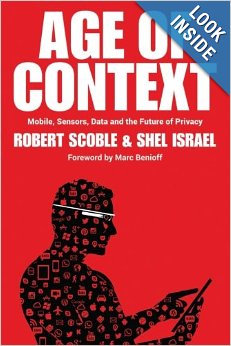Protect Privacy to Build Trust in the Age of Context

My recent post about the book, “Age of Context: Mobile, Sensors, Data and the Future of Privacy,†by Robert Scoble and Shel Israel, began to explore the benefits that might accrue from converging technologies of the “perfect storm” of mobile devices, social media, big data, sensors and location-based services. But what effect will this have on personal privacy?
Scoble and Israel provide these comments in the final chapter of the book, entitled “Trust is the New Currency”:
We have spoken to hundreds of people and looked at hundreds of technologies, and we firmly believe that adding context will make the world an easier, more efficient, cleaner and more productive place.
However, we’d be negligent if we didn’t point out that the price we pay for many of these benefits is our personal privacy. Every new piece of technology we adopt requires us to consider that price and how it will be exacted.
The book proposes the follow principles that need to be wrestled with in this area. Â These are not the exact order or terminology used in the book, but my interpretation of what is needed.
- Transparency and candor. Â Service providers don’t attempt to cover up impacts to privacy made by choices consumers make.
- Freedom to choose. Â Consumers are always able to opt in and out at will – choosing what privacy they may be willing to sacrifice for other benefits.
- The right to know. Â Consumers can know what data services providers maintain, and what that data is used for.
- The right to go silent. Â Consumers retain the right to “go silent,” or opt out of any attempts to monitor or track that consumer.
- Data ownership. Â Personal data remains property of the consumer, event when the service provider is a steward of that data.
- Human override. Â Humans can always over ride automatic processes.
Scoble and Israel propose that online service providers that get it right will gain advantage over those that don’t – that privacy will become a valuable asset, not just for consumers, but those who hope to deliver services to them.
This was echoed in a recent Huffington Post article:
Today there is a new business currency. It can’t be found at the local bank, or purchased for any price. The new commodity is trust. And while I speak of trust as a commodity it can’t be bough or sold. It has to be earned. … A shift is underway in how businesses and consumers interact, both online and in person, and the businesses that recognize the value of building trust and dare I say “wow” with each transaction will set themselves apart from the competition.
“Protect privacy to build trust” can and must become a powerful mantra for modern business.
Â
Â



